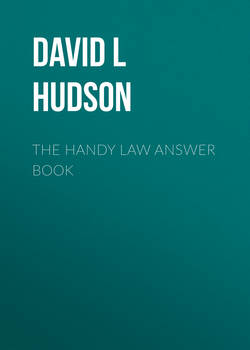Читать книгу The Handy Law Answer Book - David L Hudson - Страница 188
На сайте Литреса книга снята с продажи.
FOURTEENTH AMENDMENT Why is the Fourteenth Amendment sometimes called a Second Bill of Rights?
ОглавлениеThe Bill of Rights—the first ten amendments of the Constitution—only protects individuals from the federal government. The beginning of the Bill of Rights refers only to “Congress shall make no law.” This refers to the U.S. Congress, which was quickly interpreted by the U.S. Court to mean all three branches of the federal government—not just Congress.
However, in the 1833 decision on Barron v. Baltimore, Chief Justice John Marshall for a unanimous Court wrote that the Bill of Rights only limited the federal government, not the state governments. This meant that individuals harmed by their state or local governments could not state a claim under the U.S. Constitution’s Bill of Rights. Rather they had to assert a claim under their own state constitution.
